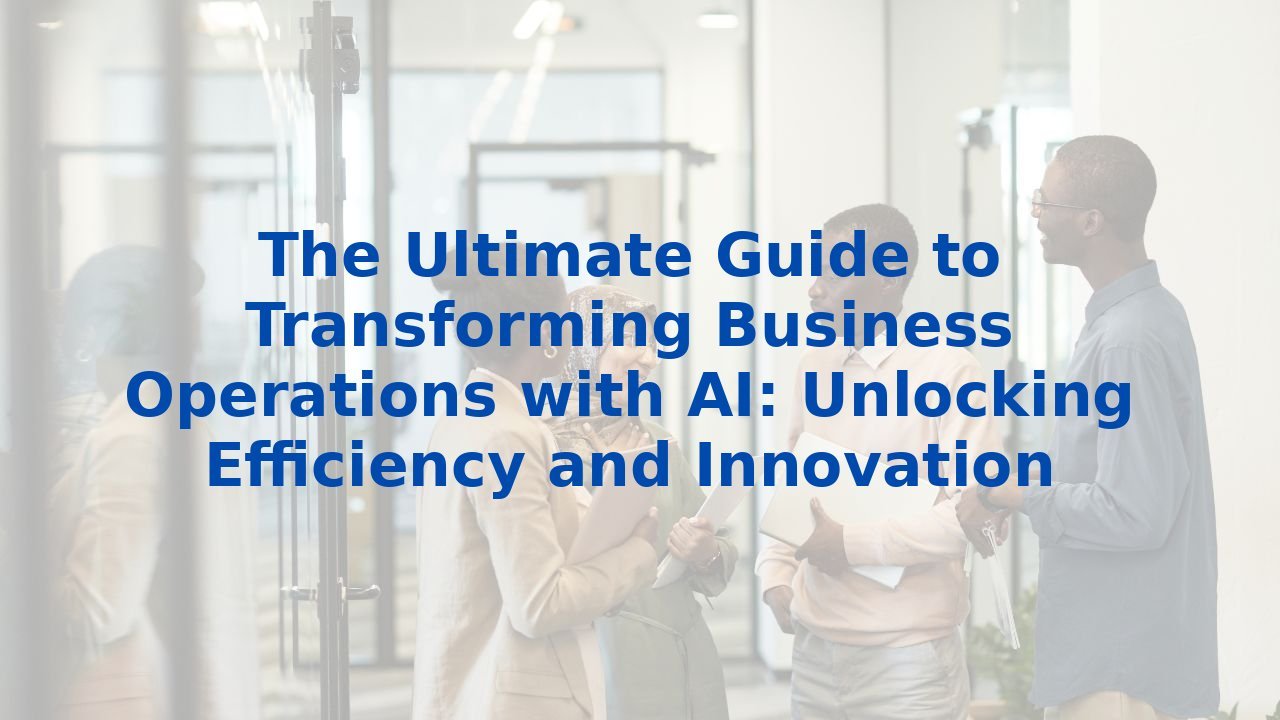The Ultimate Guide to Transforming Business Operations with AI: Unlocking Efficiency and Innovation
The Ultimate Guide to Transforming Business Operations with AI: Unlocking Efficiency and Innovation
In a world where the pace of change is accelerating, organizations are continuously searching for ways to optimize their operations and create a more innovative workforce. Enter Artificial Intelligence (AI). This powerful tool is more than just a buzzword; it's a catalyst for reimagining how businesses operate, driving efficiency and instilling a culture of innovation. Through strategic integration of AI, organizations can not only enhance their processes but also empower their teams to thrive in the face of new challenges.
Redefining Business Processes with AI
AI isn't merely a futuristic concept but a practical solution orchestrating change across various sectors. By automating mundane tasks, optimizing decision-making, and offering real-time analytics, it’s helping organizations to navigate the complexities of modern business with remarkable agility. The transformative potential of AI lies in its capability to streamline operations and sharpen competitive advantages.
Automation and Operational Efficiency
At the heart of AI's benefits is its ability to automate repetitive tasks. By taking over activities such as data entry, invoice processing, and scheduling, AI frees employees from monotonous work, allowing them to focus on strategic initiatives and creative problem-solving. This not only reduces human error but also accelerates workflows, creating a culture of efficiency that ripples through the organization.
Advanced Data Analytics
AI brings forth a new era of decision-making through advanced data analytics. By leveraging machine learning algorithms and natural language processing, businesses can glean actionable insights from vast data sets almost instantaneously. Whether it's identifying trends, forecasting sales, or optimizing marketing strategies, AI transforms data into a strategic asset that drives informed decision-making.
Customer Experience Personalization
In today’s competitive landscape, understanding customer needs is paramount. AI excels in offering personalized experiences by analyzing customer behavior and preferences. By delivering tailored recommendations and targeted marketing messages, businesses can enhance customer satisfaction and loyalty, ultimately fostering long-term relationships.
Predictive Analytics for Proactive Management
Looking beyond past performance, AI utilizes predictive analytics to forecast trends and outcomes. This capability allows organizations to anticipate market demands, optimize inventory levels, and manage production schedules with precision. The foresight provided by AI not only minimizes operational inefficiencies but also positions businesses to adapt seamlessly to changing environments.
Process Optimization and Quality Control
AI’s ability to optimize processes is a game-changer. By scrutinizing workflows, it identifies bottlenecks and inefficiencies, enabling organizations to streamline their operations. Coupled with AI-driven quality control, which monitors manufacturing processes for defects, businesses can ensure that they deliver high-quality products consistently. This not only enhances operational effectiveness but also elevates the brand's reputation in the marketplace.
Risk Management and Supply Chain Efficiency
In an era of unpredictability, effective risk management is crucial. AI equips businesses with the tools to analyze potential risks and opportunities within their operational frameworks. Furthermore, in managing supply chains, AI synthesizes historical and real-time data to predict demand fluctuations, helping organizations optimize their logistics and reduce costs. The result is a responsive and efficient supply chain ecosystem, capable of adapting to the dynamic market landscape.
The Benefits of Training Employees for AI
While the capabilities of AI are undeniable, the human element remains critical for leveraging these technologies effectively. Training employees in AI not only enhances their skills but also promotes a collaborative relationship between technology and human intelligence:
- Enhanced Skills: Training helps employees understand AI capabilities, which leads to more effective collaboration with these powerful tools.
- Improved Decision-Making: Understanding AI-generated insights allows employees to make data-driven decisions, fostering better outcomes.
- Adaptability: A workforce educated in AI is better positioned to embrace new technologies, ensuring the organization remains agile in a fast-paced business environment.
- Increased Productivity: Proficiency in AI tools enables employees to concentrate on high-value tasks, drastically boosting overall productivity.
Conclusion
AI serves as a transformative force in the business world, enriching operations through enhanced efficiency, innovation, and an unwavering focus on customer satisfaction. By automating routine tasks, harnessing advanced analytics, and optimizing processes, organizations can significantly elevate their competitive edge. Simultaneously, investing in employee training ensures that the workforce is well-equipped to harness the full potential of AI—transforming it into a collaborative partner rather than just a tool. As the journey toward operational excellence continues, embracing AI will undoubtedly be a cornerstone of sustained success in an ever-evolving market landscape.



